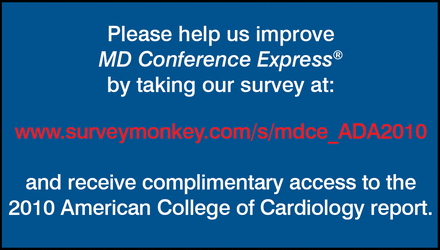Summary
Caffeine ingestion prior to exercise may reduce hypoglycemic episodes and slow the decline in blood glucose during exercise in patients with type 1 diabetes mellitus. This article discusses findings from a small study that investigated the physiological impact of caffeine ingestion prior to exercise.
- Diabetes & Endocrinology Clinical Trials
- Hyperglycemia/Hypoglycemia
Caffeine ingestion prior to exercise may reduce hypoglycemic episodes and slow the decline in blood glucose during exercise in patients with type 1 diabetes mellitus (T1DM). Ian W. Gallen, MD, Wycombe Hospital, Buckinghamshire, United Kingdom, presented findings from a small study that investigated the physiological impact of caffeine ingestion prior to exercise.
This study evaluated 5 patients with T1DM (4 males and 1 female) who were on multiple daily injection therapy. The mean age was 38.2 years, and the mean body mass index was 27.32. Study Day 1 consisted of workload assessment, as determined by maximum oxygen consumption (VO2 max). Patients were randomized to receive either caffeine 5 mg/kg or placebo 2 hours postprandially/after glargine-aspart injection with rest for 30 minutes prior to exercise. Subjects exercised on a cycle ergometer for 10 minutes at 50% VO2 max, increasing to 70% VO2 max for 30 minutes. After a total of 40 minutes of exercise, patients rested for 30 minutes. Arterialized blood glucose and lactate were measured every 10 minutes, gas exchange was measured continuously, and respiratory exchange rate (RER) was calculated. At least 1 week later, an identical exercise protocol was administered, but the patients received the opposite treatment regimen (those who previously received caffeine were given placebo and vice versa).
Blood glucose remained similar to baseline levels throughout the duration of the exercise and into the resting phase of the program in those who received caffeine. None of the subjects in the caffeine group required oral glucose. Subjects who were taking caffeine demonstrated significantly higher blood glucose levels compared with placebo after exercising at 70% VO2 max for 10 minutes (p=0.014), after exercising at 70% for 30 minutes (p=0.032), and after 30 minutes of postexercise rest (p=0.01). Blood glucose levels began to fall at the start of exercise in those who received placebo, and this rapid decline continued throughout the exercise program. Oral glucose (20 g) was administered to 2 of the patients in the placebo group in order to avoid a hypoglycemic event.
Lactate and RER measurements remained relatively consistent throughout the exercise program in those who received caffeine. Caffeine did not appear to alter RER or increase lactate levels, which suggests that caffeine does not alter substrate oxidation. These findings also suggest that caffeine may augment endogenous glucose production and oxidation when coupled with exercise.
Caffeine may be a useful tool in the prevention of hypoglycemic events during exercise in patients with T1DM. However, larger studies are needed to establish the safety and efficacy of such an approach.

Please help us improve MD Conference Express® by taking our survey at: www.surveymonkey.com/s/mdce_ADA2010
and receive complimentary access to the 2010 American College of Cardiology report.
- © 2010 MD Conference Express










